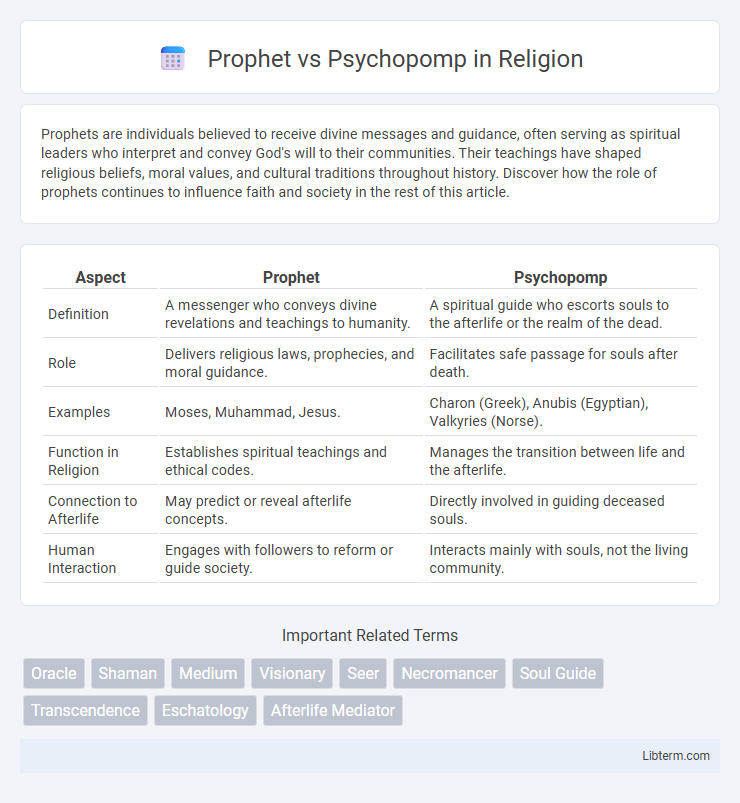Prophets are individuals believed to receive divine messages and guidance, often serving as spiritual leaders who interpret and convey God's will to their communities. Their teachings have shaped religious beliefs, moral values, and cultural traditions throughout history. Discover how the role of prophets continues to influence faith and society in the rest of this article.
Table of Comparison
| Aspect | Prophet | Psychopomp |
|---|---|---|
| Definition | A messenger who conveys divine revelations and teachings to humanity. | A spiritual guide who escorts souls to the afterlife or the realm of the dead. |
| Role | Delivers religious laws, prophecies, and moral guidance. | Facilitates safe passage for souls after death. |
| Examples | Moses, Muhammad, Jesus. | Charon (Greek), Anubis (Egyptian), Valkyries (Norse). |
| Function in Religion | Establishes spiritual teachings and ethical codes. | Manages the transition between life and the afterlife. |
| Connection to Afterlife | May predict or reveal afterlife concepts. | Directly involved in guiding deceased souls. |
| Human Interaction | Engages with followers to reform or guide society. | Interacts mainly with souls, not the living community. |
Understanding the Roles: Prophet vs Psychopomp
A prophet serves as a messenger who conveys divine revelations and foretells future events, often guiding moral and spiritual decisions within a community. In contrast, a psychopomp functions as a guide for souls transitioning from the realm of the living to the afterlife, facilitating the passage between worlds rather than delivering prophetic messages. Understanding these distinct roles highlights the prophet's focus on communication of divine knowledge versus the psychopomp's responsibility in navigating the boundary between life and death.
Historical Origins and Context
Prophets, originating in ancient Mesopotamian and Hebrew cultures, served as divinely inspired messengers conveying gods' will and future events, playing a central role in religious and social reforms. Psychopomps, rooted in Greek, Egyptian, and various indigenous mythologies, functioned as guides escorting souls to the afterlife, embodying the transition between life and death. Both roles hold significant historical contexts in shaping spiritual beliefs, with prophets influencing moral codes and psychopomps providing metaphysical frameworks for death and the afterlife.
Core Functions and Responsibilities
Prophets serve as divine messengers who communicate sacred knowledge, foretell future events, and guide communities by interpreting spiritual revelations. Psychopomps specialize in escorting souls safely from the realm of the living to the afterlife, ensuring proper transitions during the dying process. While prophets focus on transmitting prophetic insights and moral guidance, psychopomps are dedicated to navigating the metaphysical journey of death and the afterworld.
Communication with the Divine or the Dead
Prophets serve as intermediaries conveying divine messages to humanity, often receiving visions, dreams, or direct revelations from a deity. Psychopomps function as spiritual guides who escort souls to the afterlife, facilitating communication between the living and the deceased through rituals or symbolic acts. Both roles involve mediating between different realms, but prophets emphasize delivering divine knowledge while psychopomps focus on guiding and connecting with the dead.
Cultural Interpretations Across Societies
The roles of prophet and psychopomp vary significantly across cultures, with prophets commonly viewed as divine messengers delivering future insights or moral guidance, while psychopomps serve as spiritual guides facilitating souls' transition to the afterlife. In ancient Greek culture, Hermes fulfills the psychopomp's role by escorting souls, contrasting with prophets like Cassandra who reveal hidden truths. Indigenous traditions often blend these functions, depicting shamans who both communicate with spirits and guide the dead, reflecting complex cultural understandings of life, death, and destiny.
Symbolism and Representation in Mythology
Prophets symbolize divine communication, often serving as intermediaries who convey messages from gods to humans, representing insight, foresight, and spiritual guidance in mythology. Psychopomps embody the role of spiritual guides who escort souls to the afterlife, symbolizing transition, death, and the boundary between worlds. Both figures highlight different aspects of connection between the mortal realm and the divine or supernatural, emphasizing transformation and the exchange of sacred knowledge.
Key Examples from World Religions
Prophets such as Moses in Judaism, Muhammad in Islam, and Jesus in Christianity serve as divine messengers conveying God's will to humanity. Psychopomps like Anubis in ancient Egyptian religion, Hermes in Greek mythology, and Charon in Roman beliefs guide souls to the afterlife. These distinct roles highlight prophets as communicators of spiritual laws and psychopomps as soul escorts in various world religions.
Influence on Spiritual Practices
Prophets shape spiritual practices by delivering divine messages that guide ethical behavior and ritual observance in religious communities, often inspiring scriptures and prophetic traditions. Psychopomps influence spiritual beliefs and practices related to death, the afterlife, and the soul's journey, providing symbolic frameworks for funerary rites and mourning customs. Both figures impact how adherents understand metaphysical realms, yet prophets primarily focus on earthly moral guidance, while psychopomps mediate transitions between life and the afterlife.
Modern Perceptions and Relevance
Modern perceptions of prophets emphasize their role as visionary leaders who interpret divine will to guide societal values and future actions. Psychopomps, in contemporary culture, are often viewed symbolically as facilitators of transition, representing psychological or spiritual guidance through life's passages, including death. Both figures maintain relevance by addressing human needs for meaning, transformation, and connection to transcendent realities in an increasingly secular world.
Distinctive Characteristics: Prophet and Psychopomp Compared
A prophet is primarily a visionary figure who conveys divine messages, predictions, and moral guidance to their community, often serving as a social or religious reformer. In contrast, a psychopomp functions as a guide for souls transitioning from the world of the living to the afterlife, facilitating the journey between realms without delivering prophetic revelations. While prophets are associated with foresight and communication from a deity, psychopomps are linked to liminal and ritual roles focused on death and the afterlife.
Prophet Infographic

 libterm.com
libterm.com